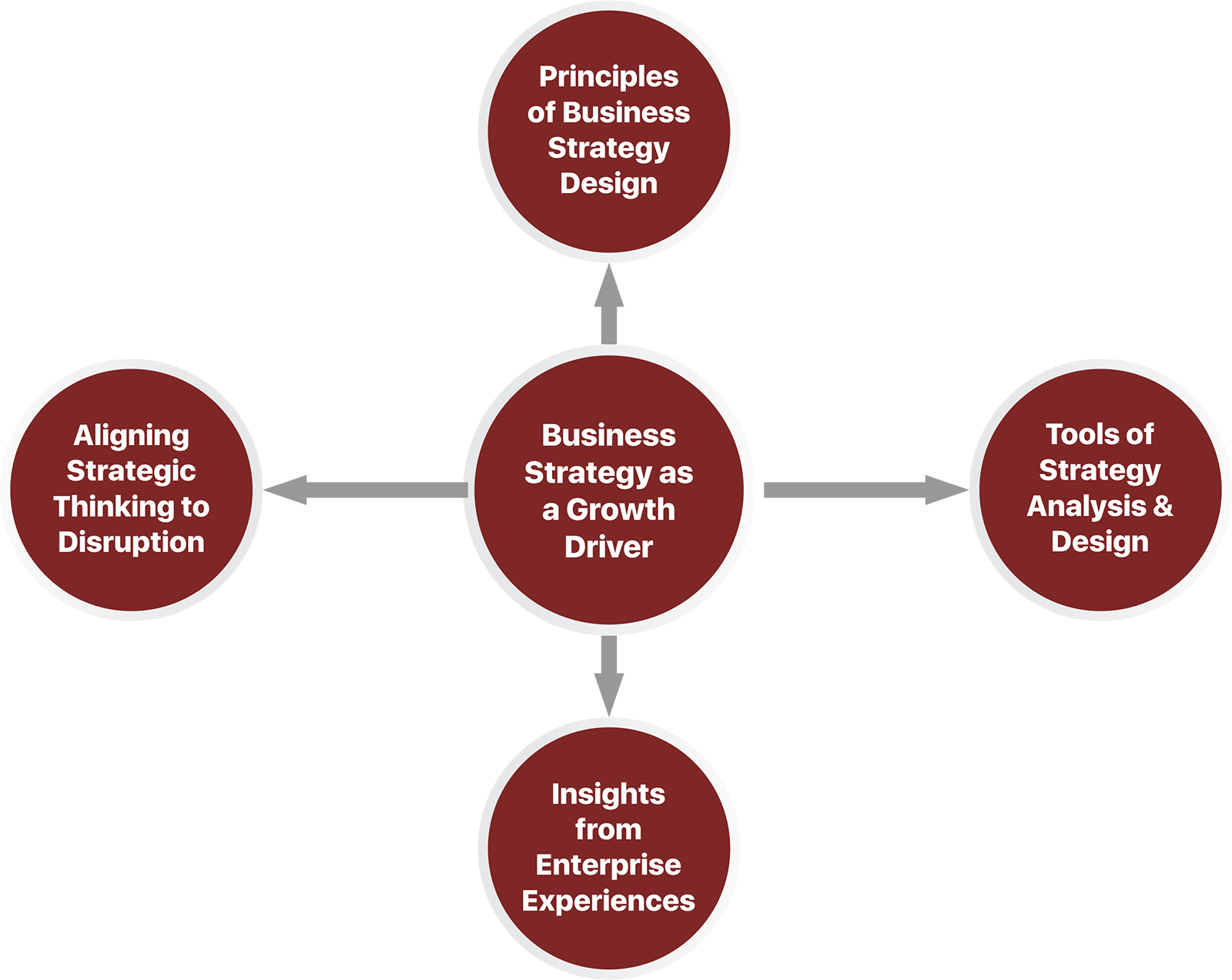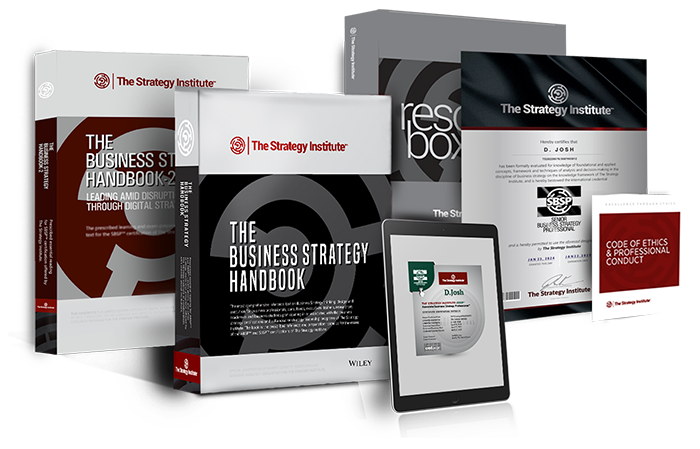Coverage of SBSP™ Exam
The SBSP™ certification exam is one of the three mandatory assessment components that candidates are required to complete and pass to qualify for the award. Please refer to the assessments section below for detailed structure. The SBSP™ certification exam carries 70% weight and seeks to primarily assess how well can candidates apply their knowledge of the core principles, theories, frameworks and techniques of strategic analysis, strategy formulation and strategy execution in analyzing decision scenarios, problems and opportunities and evolve solutions at various levels in an organization across different stages in its life cycle.
The SBSP™ exam also seeks to assess generic understanding of the dynamics of models and environments of business and industry. As it is aligned to the TSI body of knowledge, the SBSP™ exam does not dwell much on the foundational science of strategic management per se, and instead focuses on aspects that define the core processes and approaches of identifying and managing problems and opportunities related to the health, survival and growth of businesses of organizations.
Candidates entering the SBSP™ program with deep understanding and exposure of the world of global business; hands-on exposure to managerial decision-making; exposure to business processes and analysis and a foundational understanding of strategic management principles and process, generally experience swifter and deeper learning during their SBSP™ certification journey. Such candidates also find preparing effectively for the SBSP™ exam is much easier and faster.
SBSP™ exam features questions drawn from a wide selection of themes and topics defined in the TSI body of knowledge as essential for individuals intending TSI to validate their fitness for senior and more onerous roles in their respective professions. Though the two Business Strategy Handbooks provided to all SBSP™ candidates are not exactly for training or exam-preparation, they do guide the content of the SBSP™ certification exam. All SBSP™ examinees are strongly advised to refer to other books and reference material for smarter exam preparation.
| Knowledge Areas & Topics |
Percentage Weight |
| 1 |
Goals, Values, and Performance
|
5% |
| 2 |
Industry & Competitive Analysis
|
10% |
| 3 |
Resources, Capabilities, Structure & Management
|
10% |
| 4 |
Competitive Advantage & Strategic Change Management
|
15% |
| 5 |
Technology Industries & Innovation
|
5% |
| 6 |
Vertical Integration & the Scope of the Firm
|
5% |
| 7 |
Global Business and Diversification Strategy
|
15% |
| 8 |
Managing the Multibusiness Firm
|
5% |
| 9 |
External Growth Strategies
|
10% |
| 10 |
Business Strategy for Digital Disruption
|
20% |
|
Total
|
100% |
The SBSP™ Exam Format
A typical SBSP™ exam consists of 50 questions, with a mix of fact-based and critical analysis and judgment-based questions. Some exams may feature only one type of question.
TYPE A - FACT-BASED QUESTIONS
Fact-based questions directly test the exam taker's ability to recollect concepts, principles, techniques, and generally accepted practices correctly and precisely in contemporary business strategy. As exam-takers respond to these types of questions, they demonstrate an understanding of critical concepts and issues covered in the TSI body of knowledge. These questions are fact-based, with the answer options being clear statements, either clearly correct or incorrect. There is only one CORRECT answer, and exam-takers are scored only if the correct options are selected.
TYPE B - CRITICAL ANALYSIS AND JUDGMENT-BASED QUESTIONS
Critical analysis and judgment-based questions test the exam-taker's understanding of concepts, principles, and techniques at an advanced level and their ability to apply their critical analysis and judgment in gauging business strategy challenges. Ultimately, these questions contribute to the development of well-rounded business strategists. These questions have four answer choices, and ONLY one of these four would be incorrect. The rest of the three answers would be correct, but they represent varying levels of suitability for the situation expressed. The best of these three answers carries the maximum 10 marks, and the least suitable is the least – 5 marks. The third correct answer with mid-level suitability carries 7.5 marks. Exam-takers must choose only one of these four answer choices, and they are scored 0, 5, 7.5, or 10, depending on their choice of answer–option.
The SBSP™ Exam Design
The SBSP™ exam aims at validating candidates' potential to effectively deploy widely adopted concepts, techniques and process of strategic thinking, strategic analysis, opportunity and problem diagnosis, strategy design and strategy implementation in a typically large organization or a business system.
The SBSP™ exam validates this potential by assessing candidates' conceptual, theoretical and applied knowledge of core and generally followed principles, frameworks, techniques and models of strategic analysis and decision-making in varying business contexts, scenarios and environments that organizations encounter in different stages across their life-cycle.
The SBSP™ exam content is aligned to the TSI body of knowledge, which the first of the two TSI Business Strategy Handbooks covers reasonably well. Indeed, since the business strategy space is extremely dynamic, all SBSP™ candidates are expected to also refer to external journals and books; listen to podcasts of experts and participate in professional development activities and events to enrich their perspective of strategy in business.
Qualifying the SBSP™ Exam
SBSP™ has three mandatory assessment components – A1 (weightage 0%), A2 (weightage 30%), and A3 (weightage 70%). All SBSP™ candidates, without exception, are required to qualify these assessments to be considered for the award of the SBSP™ credential. All these assessments have to be completed before you schedule your SBSP™ exam; Hence, it is of extreme importance that you plan your study, assessment submissions, and exam schedule efficiently.
Assessment |
Weight |
Related Module & Coverage |
Reading Resource |
Assessment Mode |
A1 |
0 |
Business Strategy Tools |
Business Strategy ToolBook and Enterprise Business Strategy Experiences |
Online Quiz that can be taken anytime on the candidate's dashboard |
A2 |
30% |
Submission of a Professional Development Report in a prescribed format, outlining the various activities and formal or informal learning they have undertaken in areas pertinent to business strategy. This may include attendance at seminars, webinars, podcasts, conferences, and conclaves, as well as participation in workplace projects and online courses. |
_ |
Submission in a prescribed format* |
A3 |
70% |
The science of developing and executing Business Strategy; covers principles, concepts, frameworks, processes and tools of analysis and development |
Printed Resources
The Business Strategy Handbook, and The Business Strategy Handbook-2
|
Online Exam conducted on the examstrong portal |
*The report is a vital component of the evaluation process as it provides a comprehensive overview of the candidate's professional development and their continued commitment to enhancing their knowledge and skills in this field. It is imperative that candidates adhere to the prescribed format and provide a detailed account of their activities, including the objectives, outcomes, and learnings derived from each endeavor. We trust that candidates will take the opportunity to showcase their competencies and overall commitment to professional growth through this report, thereby demonstrating their suitability for roles that demand a nuanced understanding of business strategy.
Preparing for the SBSP™ Exam
SBSP™ exam aligns to the TSI body of knowledge, which covers essential topics in which knowledge is necessary for SBSP™ candidates to prove their fitness for complex roles in senior positions. It is critical that all SBSP™ candidates continue to keep the strategy of their organizations directly linked to the deliverables of their own roles, and KRAs.
While the two TSI Business Strategy Handbooks build a very good mental framework of core concepts, tools and techniques in business strategy to aid in preparing for the SBSP™ exam, additional external reading is also essential to improve awareness of current strategic thinking and strategic analysis trends. Business Strategy is an evolving discipline and will perhaps never become an exact science, which makes containing the entire practice into a single textbook impossible.
While SBSP™ candidates are advised to use the two TSI Handbooks on Business Strategy as their main reference for preparing for their SBSP™ exam, it is just one piece in preparation for the SBSP™ examination. Although a sizable number of questions in a typical SBSP™ exam are drawn from content which is available in the handbooks, some of the questions may be drawn from content from other sources. TSI therefore strongly advises all examinees to research other online and offline resources to increase their knowledge of concepts and awareness about how business strategy impacts various functions and decision-making in an organization.


 Click here to register for SBSP™
Click here to register for SBSP™
























